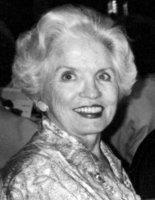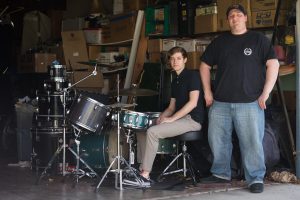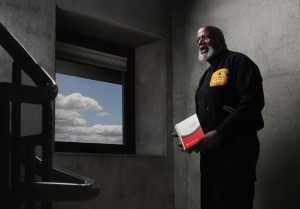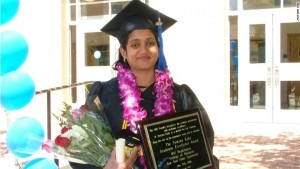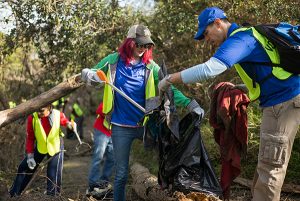
Alumnus Ralph Murrieta Jr, ’11 MPA, right, and other Spartans volunteered to help with cleanup efforts following flooding along the Coyote Creek and in San Jose neighborhoods on March 11. (Photo: James Tensuan, ’15 Journalism)
By Barry Zepel
The San Jose State University community has a long tradition of helping during times of crisis. That was the case on Feb. 21 after the recent record rainfall led to Anderson Dam spilling over its banks in Morgan Hill and into the Coyote Creek, which then overflowed onto various streets and neighborhoods in San Jose, causing flood damage and displacing residents.
While university administrators offered support to students, staff and faculty in the affected neighborhoods, CommUniverCity Director Dayana Salazar coordinated with The Health Trust to start a fundraiser to support local residents. As of the end of March, the groups had raised $9,430.
In addition to financial support, Spartan volunteers also helped with cleanup work near the creek and around the city. Keep Coyote Creek Beautiful (KCCB), the South Bay Clean Creeks Coalition and the city of San Jose initiated clean-up work starting on Feb. 24, with follow-up efforts into March. Alumnus Ralph Murrieta Jr. and students Shannen Osborne and Maribel Muratalla were among a contingent of volunteers ready to help on March 11. Murrieta and Muratalla have been KCCB team leaders for two years.
On an early Saturday morning, volunteers, including Murrieta, found mud, downed fences, Ethernet cables and copper wires, as well as fallen debris from trees that had been drenched by the rains and accompanying high-velocity winds of the previous days. Murrieta, ’11 MPA, is no rookie when it comes to community service and volunteerism.
“I’ve been volunteering with Keep Coyote Creek Beautiful, (a community group) dedicated to restoring the local watershed, for roughly a year-and-a-half,” he explained.
Murrieta said he first became involved in community volunteering in 2015 through SJSU’s CommUniverCity program. CommUniverCity is a unique partnership between the university and the city of San Jose that engages SJSU students and faculty members with residents and city staff members for learning projects that accomplish neighborhood-defined goals. The program creates and supports 50 community action projects annually in a multitude of disciplines. They range from after-school tutoring and nutrition education to adult financial literacy classes.
With cleanup being a vital community need in March, Murrieta served as team leader for a group of 15 to 20 other volunteers along the banks of the creek.
“Among the things we found (and picked up) were traces of homeless encampments, including clothing, bedding, various metal and wood debris items, and food wrappers,” he said. “While our operation wrapped up after a few hours – around 11 a.m. – I know that some of the volunteers went on to assist other clean-up operations that were taking place in the city.”
Deb Kramer, program manager for KCCB, said their efforts were scheduled for two hours on March 11, but many volunteers stayed longer to help clean up the Olinder play area, including removing tan bark and sand, and cleaning play structures and picnic benches that had been contaminated by the flood.
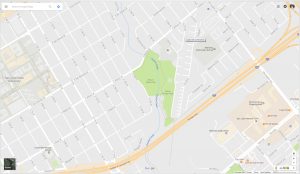
SJSU student and alumni volunteers participated in cleanups along the Coyote Creek, near William Street Park and the Selma Olinder Play Area, east of campus.
Osborne, a senior majoring in communications, has been involved with KCCB since taking a couple of environmental courses at the university. She is currently serving as an intern with the community agency. The university’s partnership with KCCB is coordinated through the Center for Community Learning and Leadership, a program that supports service-learning opportunities for students.
“I was helping check in other volunteers at the beginning, so initially I saw many eager people who wanted to help,” she said. “This was not something that residents of San Jose or other surrounding cities ever would have expected to happen, especially since we were just in a drought for so long.”
Among the items she and other volunteers picked up were old tires, shopping carts, old clothing and blankets, and a quarter ton of trash.
“For me, this hits very close to home since I live right along the creek,” Osborne said. “Luckily, I was not harmed by the flooding, but it was definitely too close for comfort and opened my eyes that my family and I could have been evacuated. I definitely wanted to do all that I could to make sure the areas that were affected had some help.”
Likewise, Murrieta’s home was spared any personal loss, but he witnessed firsthand the destructive forces of the recent flooding in the city.
“I did see some of the flooded streets near my (place of) work,” he said.
Both Osborne and Murrieta encouraged others to get involved as community volunteers.
“I cannot stress enough how important it is to give back to your community,” Osborne said. “And you get to meet great people who are excited to be involved in something that helps the local environment. Each (volunteer) helps make such a significant difference.”
Murrieta noted what can be learned from the experience.
“History is happening every day, and you can’t shape it and society by reading a book. You have to get involved,” he said. “It can add to what you are learning in the classroom by providing depth to the issue.”
